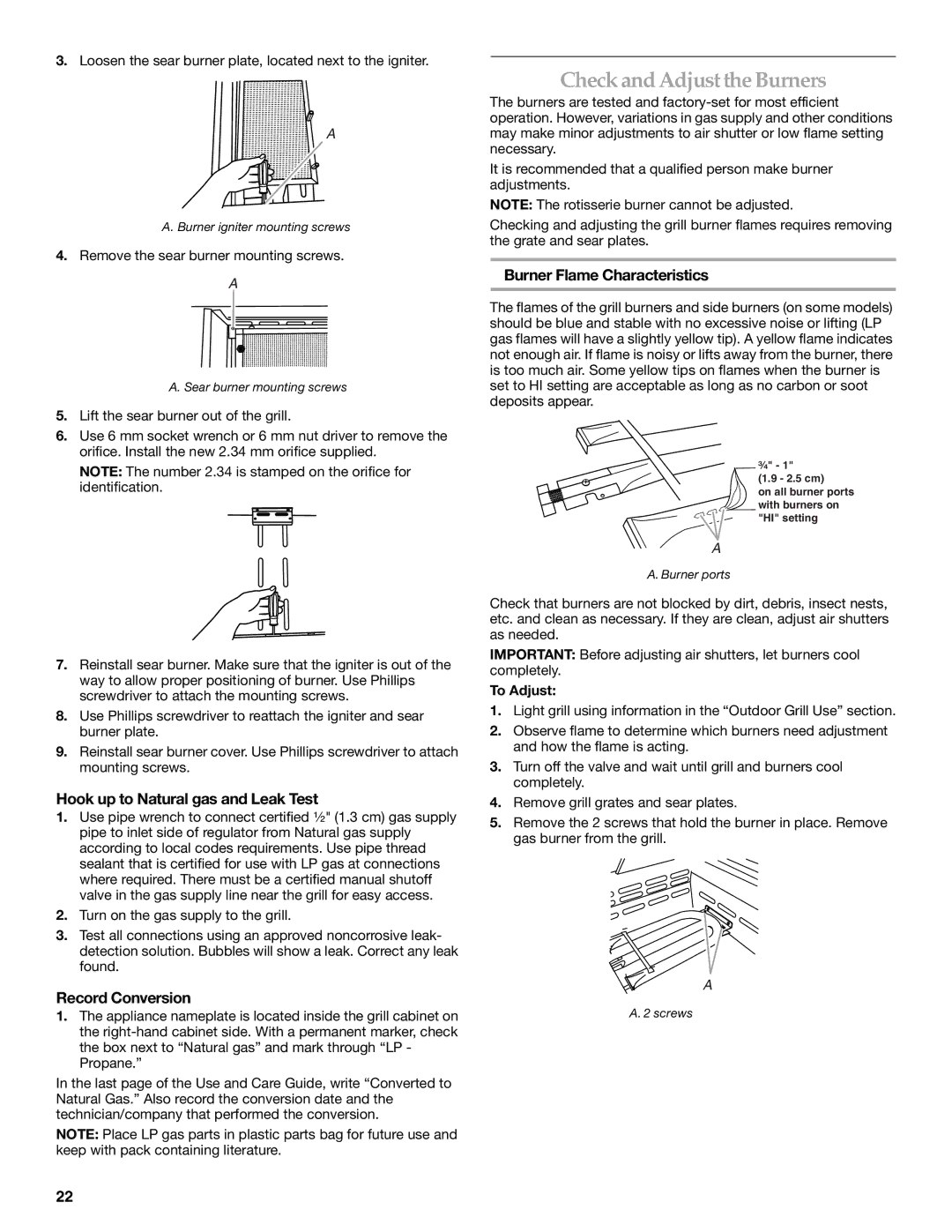
3.Loosen the sear burner plate, located next to the igniter.
A
A. Burner igniter mounting screws
4.Remove the sear burner mounting screws.
A
A. Sear burner mounting screws
5.Lift the sear burner out of the grill.
6.Use 6 mm socket wrench or 6 mm nut driver to remove the orifice. Install the new 2.34 mm orifice supplied.
NOTE: The number 2.34 is stamped on the orifice for identification.
7.Reinstall sear burner. Make sure that the igniter is out of the way to allow proper positioning of burner. Use Phillips screwdriver to attach the mounting screws.
8.Use Phillips screwdriver to reattach the igniter and sear burner plate.
9.Reinstall sear burner cover. Use Phillips screwdriver to attach mounting screws.
Hook up to Natural gas and Leak Test
1.Use pipe wrench to connect certified ¹⁄₂" (1.3 cm) gas supply pipe to inlet side of regulator from Natural gas supply according to local codes requirements. Use pipe thread sealant that is certified for use with LP gas at connections where required. There must be a certified manual shutoff valve in the gas supply line near the grill for easy access.
2.Turn on the gas supply to the grill.
3.Test all connections using an approved noncorrosive leak- detection solution. Bubbles will show a leak. Correct any leak found.
Record Conversion
1.The appliance nameplate is located inside the grill cabinet on the
In the last page of the Use and Care Guide, write “Converted to Natural Gas.” Also record the conversion date and the technician/company that performed the conversion.
NOTE: Place LP gas parts in plastic parts bag for future use and keep with pack containing literature.
Check and Adjust the Burners
The burners are tested and
It is recommended that a qualified person make burner adjustments.
NOTE: The rotisserie burner cannot be adjusted.
Checking and adjusting the grill burner flames requires removing the grate and sear plates.
Burner Flame Characteristics
The flames of the grill burners and side burners (on some models) should be blue and stable with no excessive noise or lifting (LP gas flames will have a slightly yellow tip). A yellow flame indicates not enough air. If flame is noisy or lifts away from the burner, there is too much air. Some yellow tips on flames when the burner is set to HI setting are acceptable as long as no carbon or soot deposits appear.
³⁄₄" - 1"
(1.9 - 2.5 cm)
on all burner ports with burners on "HI" setting
A
A. Burner ports
Check that burners are not blocked by dirt, debris, insect nests, etc. and clean as necessary. If they are clean, adjust air shutters as needed.
IMPORTANT: Before adjusting air shutters, let burners cool completely.
To Adjust:
1.Light grill using information in the “Outdoor Grill Use” section.
2.Observe flame to determine which burners need adjustment and how the flame is acting.
3.Turn off the valve and wait until grill and burners cool completely.
4.Remove grill grates and sear plates.
5.Remove the 2 screws that hold the burner in place. Remove gas burner from the grill.
A
A. 2 screws
22
